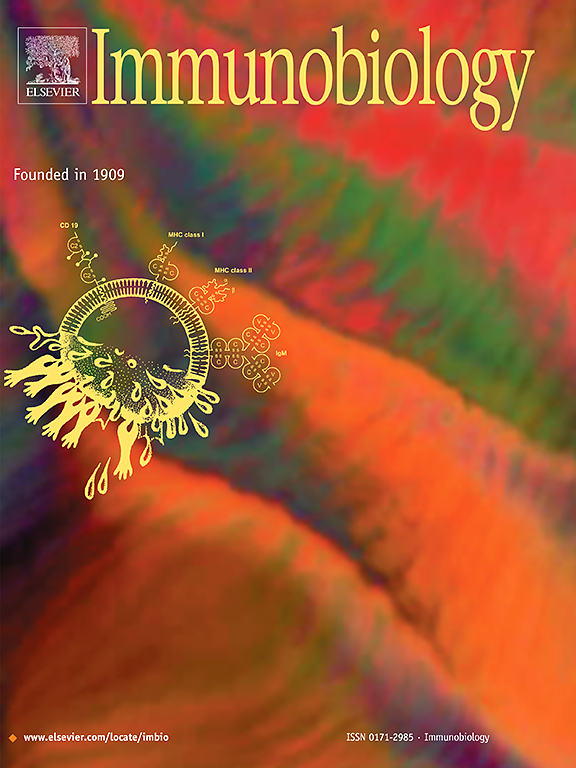Single-cell RNA and TCR repertoire analysis identify markers of virus-specific T cells
IF 2.3
4区 医学
Q3 IMMUNOLOGY
引用次数: 0
Abstract
Adoptive cell therapy (ACT) is a promising method for treating cancer and viral infections. Identifying antigen-specific T cells (ASTs) is critical to ACT. We investigated biomarkers for identifying ASTs. Peripheral blood mononuclear cells from healthy donors underwent staining with carboxyfluorescein succinimidyl ester (CFSE) to detect proliferating ASTs. Following exposure to CMV pp65 peptide and interleukin-2 for T-cell expansion, CD3+/CD8+ T cells were isolated at varying time points, revealing distinct populations. TCR repertoire analysis unveiled nine major clones in CFSE−/CD3+/CD8+ T cells on day 7, constituting 93.9 % of total cells. Contrarily, CFSE+/CD3+/CD8+ T cells exhibited minimal overlap with major TCR clones. Combined single-cell RNA-seq analyses highlighted upregulated genes associated with cell cycle proliferation and T-cell cytotoxicity. Engineered T cells expressing dominant clones effectively engaged CMV pp65 peptide, triggering T-cell activation and interferon-γ production. A set of seven upregulated genes in CFSE−/CD3+/CD8+ T cells on day 7, indicative of proliferating ASTs, was used to identify antigen-specific CD3+/CD8+ T cells on days 2–3, exhibiting 93.52 % accuracy. These markers predicted CFSE−/CD3+/CD8+ T cells with dominant TCR clones following exposure to EBV peptide with 74.59 % accuracy. In conclusion, we identified new markers facilitating the early isolation of viral antigen-responsive T cells.
单细胞RNA和TCR库分析鉴定病毒特异性T细胞的标记物
过继细胞疗法(ACT)是一种很有前途的治疗癌症和病毒感染的方法。识别抗原特异性T细胞(ast)对ACT至关重要。我们研究了用于识别ast的生物标志物。健康供者外周血单个核细胞用羧基荧光琥珀酰亚胺酯(CFSE)染色检测增殖的ast。暴露于CMV pp65肽和白细胞介素-2进行T细胞扩增后,CD3+/CD8+ T细胞在不同时间点分离,显示不同的群体。TCR库分析在第7天发现CFSE−/CD3+/CD8+ T细胞中有9个主要克隆,占总细胞数的93.9%。相反,CFSE+/CD3+/CD8+ T细胞与主要TCR克隆的重叠最小。联合单细胞RNA-seq分析强调了与细胞周期增殖和t细胞毒性相关的上调基因。表达优势克隆的工程化T细胞有效地参与CMV pp65肽,触发T细胞活化和干扰素γ的产生。在第7天,CFSE−/CD3+/CD8+ T细胞中有7个表达上调的基因,指示ast增殖,用于鉴定第2-3天的抗原特异性CD3+/CD8+ T细胞,准确率为93.52%。这些标记物预测EBV肽暴露后具有显性TCR克隆的CFSE−/CD3+/CD8+ T细胞的准确率为74.59%。总之,我们发现了新的标记物,有助于早期分离病毒抗原反应性T细胞。
本文章由计算机程序翻译,如有差异,请以英文原文为准。
求助全文
约1分钟内获得全文
求助全文
来源期刊

Immunobiology
医学-免疫学
CiteScore
5.00
自引率
3.60%
发文量
108
审稿时长
55 days
期刊介绍:
Immunobiology is a peer-reviewed journal that publishes highly innovative research approaches for a wide range of immunological subjects, including
• Innate Immunity,
• Adaptive Immunity,
• Complement Biology,
• Macrophage and Dendritic Cell Biology,
• Parasite Immunology,
• Tumour Immunology,
• Clinical Immunology,
• Immunogenetics,
• Immunotherapy and
• Immunopathology of infectious, allergic and autoimmune disease.
 求助内容:
求助内容: 应助结果提醒方式:
应助结果提醒方式:


